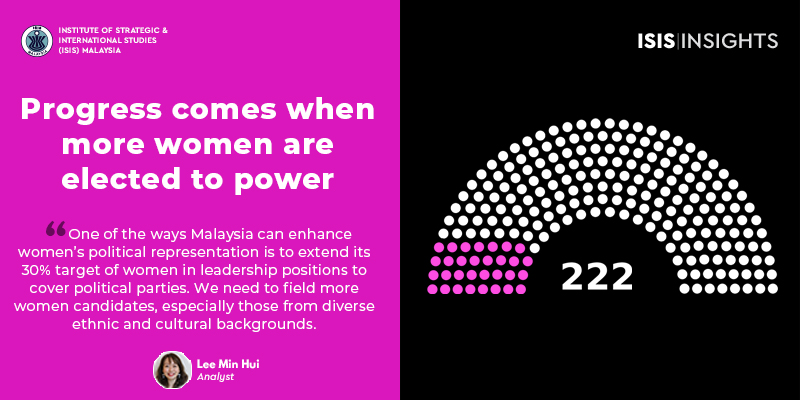We must ask why politics lagging women’s economic, educational advancements
WOMEN make up about half of the Malaysian population but only 15% of parliamentarians. As we celebrate another International Women’s Day on 8 March under the shadow of the Covid-19 pandemic – a crisis that has widened existing gender gaps – it has never been more urgent to consider Malaysia’s commitment to empowering women in politics.
Malaysia’s poor record in women’s political representation is puzzling for several reasons. Women outnumber men across all levels of education. Economic empowerment indicators for women have improved over the years with women’s labour force participation rate moving up at least 8.5 percentage points since 2010. Malaysia also recently surpassed its target of 30% of women in senior leadership positions across local companies and organisations.
So, why hasn’t women’s political representation improved in tandem with their educational and economic outcomes? In the past decade, the number of elected women members of parliament (MPs) increased by about 5 percentage points. Across ministerial positions, women constitute 16% of leaders, compared with 84% of men. Both these indicators represent low-hanging branches that Malaysia can seize to improve on its performance in the global gender gap index. Yet, there remains little to no commitment to improve women’s political representation.
For one, policy action towards empowering women has primarily been waged on economic terms. There has been a nationwide reckoning in recent years on women’s contributions to productivity and economic growth. As such, the policy focus in the five-year development plans and annual budget has been confined largely to helping women enter and stay in the workforce. While these are beneficial, seeing women merely as a cog in the country’s economic machinery is myopic at best.
Without women in political decision-making roles, countries run the risk of experiencing a “democratic deficit”. Their representation in government helps diversify legislative and policy agendas, especially on issues pertaining to women or vulnerable groups. It bolsters democratic accountability and ensures that the needs and welfare of women are provided via policymaking.
What this could mean for Malaysia, especially with the pandemic, is policies that are not only gender-sensitive but also crisis-sensitive. During the movement -control order (MCO), more than 9,000 domestic violence cases were reported, with women making up the bulk of the victims. On the economic front, ISIS Malaysia estimates suggest that young women faced major employment losses and labour force exits – about 4.4 times and 115 times higher respectively than the labour force average at the peak of the first MCO.
This has been compounded by the increase in women’s unpaid care work as schools and childcare centres were shuttered. The dearth of women decision-makers in politics exacerbates these issues and poses long-term socioeconomic implications.
One of the ways Malaysia can enhance women’s political representation is to extend its 30% target of women in leadership positions to cover political parties. We need to field more women candidates, especially those from diverse ethnic and cultural backgrounds. With political parties playing a significant gatekeeping role, action must begin here.
Setting targets is only the first step. This target must be mandatory to account for resistance stemming from a male-dominated culture and a patriarchal leadership structure. Social discrimination, lack of financial resources and care work also undermine women’s candidacy and progress in politics. Therefore, enabling policies must factor in the fact that the playing field is inherently unequal.
Going further, more women in politics do not guarantee more gender-sensitive policymaking. Substantive representation – representatives who act in the interests and needs of women – are equally important. If the recent saga about “marital advice” from a senior public official is anything to go by, it is clear that descriptive representation – wherein the representative is a member of the group – does not mean that they act in the interests of the communities they aim to represent.
Election rumours are rife and, as we move forward, we must begin to recognise women’s rights in contributing to nation-building as critical agents of change. With the pandemic, Malaysia can no longer afford to gloss over the lack of women’s political representation. If we want to see inclusive development, we must start with inclusive representation.





